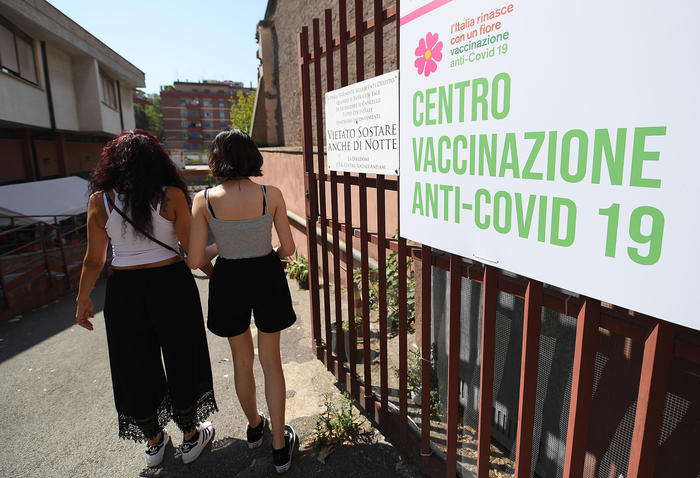Provide mandatory anti-Covid vaccination.
This is the indication coming from Prime Minister Mario Draghi and that, according to jurists, it would be possible to implement quickly with an
ad hoc law
based on constitutional dictates.
A path, that of the obligation, which aims to block the spread of the contagion still in progress but which in any case sees different positions even among the experts, some of whom consider an obligation more appropriate only for specific categories.
That we are going in the direction of an extension of the anti-Covid immunization obligation was confirmed by Draghi himself, together with the Minister of Health Roberto Speranza, in a press conference held yesterday to take stock of the recovery also in the new year school.
Currently, the vaccination obligation is foreseen for doctors and health personnel,
and the suspensions of non-vaccinated white coats have already begun - which still remain a clear minority.
For teachers, however, a green pass is required.
However, the prospect of an extended vaccination obligation now appears closer and it is, explains to ANSA the jurist Amedeo Santosuosso, professor of law, science and new technologies at the University of Pavia, of a path "feasible in a short time through a law , which would respect all the trappings of constitutionality ".
Article 32 of the Constitution, in fact, clarifies, "provides for the possibility of imposing mandatory health treatment through a law, thus determining a general obligation for citizens.
A law of this type would be justified by the documented benefits that the treatment, in this case the vaccine, would lead to the community and to individuals ". Scientific studies, he points out, "in fact demonstrate the positive effects of vaccines and a requirement at the basis of a law that provides for the obligation for health treatment is precisely the advantage for the community and also for individuals.
There would therefore be all the requirements for such a law "
.
As for timing, he says, "these depend on Parliament: in this case it is a political question rather than a legal one". In any case, the expert specifies,
"it is still possible, even in the absence of a national law, to
carry out specific vaccination obligations for individual work categories".
And other experts point to an obligation 'by sector', starting with Amerigo Cicchetti, director of ALTEMS, the High School of Economics and Management of Health Systems of the Catholic University of Rome. The obligation, currently not present in any country, he says is a "road marked, for Italy as for other nations, in order to stop the epidemic: in my opinion it is a viable path without particular legal problems but
I believe that the obligation should not be foreseen for everyone but for specific categories
, starting from schools and universities, the PA in contact with the public and transport ". For the others, in fact, "the risks can be reduced by resorting to the green pass and smart-working".
The obligation is right but it would be easier if indirectly according to the immunologist and member of the Technical Scientific Committee Sergio Abrignani: "The best way to contain a pandemic is to
vaccinate almost everyone and to do so you need a sort of obligation
. it is technically difficult to make an absolute obligation - he explains - you can get there with an indirect, very strong and substantial obligation, for example through an almost totalizing green pass ". On the contrary, the virologist Fabrizio Pregliasco favors a "universal" obligation for the entire vaccinable population, providing for the use of services already present in the area, with the collaboration of general practitioners.
After the last mandatory vaccine introduced in Italy in the 90s against hepatitis b, the most recent example dates back to the 2017 law of the then Minister of Health Beatrice Lorenzin, which introduced a vaccination obligation for school attendance limited to vaccines of the first years of life, such as that against tetanus, diphtheria, measles. An obligation, Abrignani and Pregliasco conclude, which led to "excellent results" with a sharp increase in vaccinations among children.

